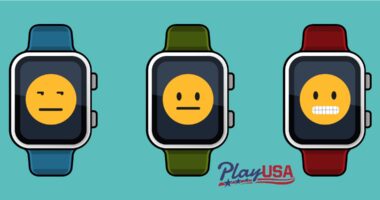A trend percolating in online gambling and sports betting brings to mind an old adage: Just because you can doesn’t mean you should.
When exploring being able to place bets on your smartwatch, the US online gambling industry needs to consider whether it’s stepping over the line. Is such a thing really necessary?
Thankfully, the trend is still more in the exploratory phase, but operators in the gambling space have flirted with the idea of Apple Watch betting apps for quite a while. It’s unclear if there are plans to expand upon that premise.
Regardless, there could be unintended consequences, such as problem gambling. People are already addicted to their devices without adding a gambling element.
US online gambling’s previous forays onto smartwatch gaming
So far, the activity along the lines of gambling apps for devices like the Apple Watch has been explorative for companies operating in the United States. Unibet, which can offer online casino and sports betting products in multiple US states, has released its own Apple Watch app.
However, that isn’t a gambling app, exactly. It’s merely informational, allowing users to check in on horse racing and sports results.
Playtech, which offers live dealer games and other kinds of gambling content to US online casino operators, has developed an Apple Watch platform that could allow its partners to take bets via smartwatches.
In 2014, MicroGaming demonstrated its smartwatch gambling apps capability at the Mobile World Congress:

US online sportsbook operators have yet to embrace this technology that MicroGaming and Playtech have introduced. That could change at any time, though. Gambling companies in the US have flirted with similar technologies.
Would you sports bet in your car? Would you gamble on your TV?
Earlier this year, Simplebet announced a partnership with DraftKings. The program involved is a new capability for the Connected Travel app in vehicles. It allows DraftKings account holders to use their cars’ voice command features to place a bet on sporting events through DraftKings.
FuboTV has integrated the ability to initiate bets through its streaming television service while watching live sports. Again, though, the bets actually take place through a connected smartphone gambling app. Bettors would have to not only have active accounts with Fubo but be using the service in either Arizona or Iowa, as those are the only two states Fubo Sportsbook has licensure.
Philosophers have pondered the neutrality of technology, arguing that it is merely a tool with no inherent moral value. Using that technology, not the technology itself, could exude or lack a moral quality, so the thinking goes. There has been some investigation into that premise when it comes to gambling.
A study of virtual reality casino gambling
In February 2017, Frontiers in Psychiatry used a virtual reality casino environment to examine whether virtual reality could be used as a cognitive behavior therapy to treat people with pathological gambling issues.
Their findings were that a VR gambling experience produced responses in the participants similar to those they displayed in an actual physical casino. The anticipation and delivery of the game results, whether physical or virtual, were what the participants were after.
Another type of “addiction” merits discussion here, though. In January 2022, Slicktext shared the results of a survey regarding smartphone usage.
Among the findings were that 22% of smartphone users “admitted to checking their device every few minutes.”
While Wonlex argues smartwatches can alleviate “smartphone addiction” by reducing application features, among other things, that potential benefit diminishes if smartwatch apps become more functional, which is what gambling apps would achieve. That demonstrates how smartwatch gambling apps could be more of a liability for people with pathological gambling issues than smartphones.
Smartwatch gambling on your wrist comes with risks
Any time there is a discussion of responsible gambling, it must include personal responsibility on each gambler’s part. Each person bears responsibility for their conduct when it comes to gambling.
However, gambling companies share responsibility as well. They must carefully consider whether enabling customers to put a casino on their smartwatches is the responsible choice. A few material differences between smartphone and smartwatch platforms could make smartwatch gambling apps more problematic.
Skywood Recovery points out that people who struggle with gambling “often hide their issues.” It might be easier to mask that behavior on a smartwatch than on a smartphone. Additionally, smartwatches’ greater app accessibility could act as a more powerful trigger.
For example, a person who struggles with problem gambling might not pull out a smartphone during a business meeting or family event, but a few quick taps on their smartwatch might be less of a social faux pas in those situations.
Furthermore, while a person can silence their phone and ignore push notifications, the whole purpose of a smartwatch is communication. Again, that could mean more frequent and powerful triggers.
It’s easy to argue that those who struggle with problem gambling can simply not use the technology in that way. However, that argument is dismissive of the actual problem behind problem gambling. Those who struggle with gambling addiction are incapable of making such choices for themselves.
It isn’t the job of gambling companies to protect problem gamblers from every possible trigger. They don’t have to go out of their way to make it as easy to gamble as possible either, though.


